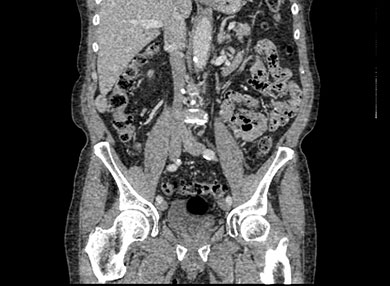You can book an appointment 24/7. Call Olivia on:
What is a CT scan?
Computed Tomography (CT) scans create detailed two or three dimensional images of your organs, bones, or tissues using computer processing and X-Rays taken from various angles.
Compared to an ordinary X-ray, a CT scan creates more detailed images of your anatomy; it enables doctors to see what’s inside the body, inspect the area in question, and see diseases that they won’t otherwise notice in a standard X-ray image.

Doctors often recommend patients to undergo a CT scan to assess further an abnormality that’s detected in X-ray or ultrasound. A CT scan can be done for the head or brain, neck, chest, abdomen, pelvis, sinus, and spine.
CT scans can detect bone and joint problems; cancer; heart, lung, and liver problems; internal injuries caused by accidents; tumour; internal bleeding and blood clot; excess fluid; and infection.
Doctors can also use the CT scan results to see how the patient’s body is responding to ongoing treatment or to plan for surgeries and other treatments.
Preparation
Usually an outpatient procedure, you are asked to lie on a table inside the CT machine, which takes a series of pictures of a body part or body structure from many angles. The computer takes these images and generates a cross-sectional image. Just like a slice of a piece of bread, this image shows a slice of that structure.
This process goes on until we have a number of slices, which the computer then stacks on top of the other to form a very detailed image of that body structure.
MMI's expert team uses the lowest dose of radiation possible to create world-class CT images.
Some studies may require oral contrast and/or intravenous (IV) iodine contrast to provide additional diagnostic information.
Preparing for the procedure differs depending on the body part that needed examination.
CT scans of different body parts, or for different conditions, require different kinds of preparation. Read these guidelines to prepare for your appointment.
Abdomen and pelvis
- No food or drink (except some water) for 2 hours prior to your appointment.
- Arrive 1 hour before your appointment for oral contrast.
Brain, neck or chest
- No food or drink (except some water) for 2 hours prior to your appointment.
- Arrive 15 minutes before your appointment.
Coronary angiogram
- No food or drink (except some water) for 2 hours prior to your appointment.
- Arrive 1 hour before your appointment.
- Stop all caffeine, cigarettes and other stimulants for 12 hours prior to your appointment.
Other procedures
No special preparation is needed for:
- spinal scans
- scans of extremities, such as hip, knee, hand or wrist
- sinus scans
- CBCT dental or other scans.